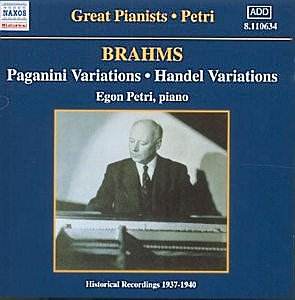Johannes BRAHMS
Variations on a theme by Paganini Op.35,
Variations and Fugue on a theme by Handel Op.24
Rhapsodies - Opp.79 &
Op.119/4
 Egon Petri
(piano)
Egon Petri
(piano)
 NAXOS 8.110634
[59.18]
NAXOS 8.110634
[59.18]
Crotchet
AmazonUK
AmazonUS

Egon Petri was born in Hanover in 1881 and died in the States in 1962. Of
Dutch descent, Petri was a favourite pupil of Busoni (who Claudio Arrau nominated
as the greatest pianist he ever heard). Writing as someone who has not heard
too much of Petri's playing over the years, I'm delighted to sample his
impressive Brahms; indeed, I thoroughly enjoyed this CD.
Petri's style might be described as masculine, weighty and deeply serious.
He is also rather 'modern' in approach in that he doesn't resort to deviations
of pace or stylistic incongruities to get noticed. Petri stands for respect
and integrity, which should not be taken as a polite way of saying that he's
metronomic or literal.
What distinguishes the three sets of variations (Petri re-states the tune
to open Book 2 of the Paganinis) is not only Petri's technical mastery -
which I would describe as unostentatiously fabulous - but his unerring sense
of placing each variation within the whole. As long-viewed as Petri's conception
is, this doesn't preclude a light touch (Handel, tracks 42 and 47) or affection
and lilt (Paganini, track 20). That the latter is really quite special is
due to Petri's touch and poise. The dominant quality is Petri's innate searching,
perceived not by unduly slow or 'stretched' phrasing but because Petri's
profundity of expression comes from within.
While I could have done with a tad more wit in the 'musical-box' variation
(Handel, track 53) I latch on to Petri's nostalgia and his telling diminuendo
at the close. His building of the closing fugue is masterly and wonderfully
cumulative, which encapsulates Petri's technical address, his lyrical warmth
and his grasp of structure.
I'm a little less taken with the Rhapsodies although the first of the Op.79
pair is on a par with the excellence of the variations, but its companion
could be more poised and expressively charged. The last of the Op.119 set
is better but doesn't quite engage with the same searching communication
that makes the variations so rewarding.
The three rhapsodies were recorded in 1940 (New York), the Paganinis are
from 1937, the Handels a year later (both Abbey Road). The transfers will
be welcomed by anyone resistant to crackle and pop, for surfaces are virtually
silent. Fortunately, whatever processes have been used, there's no degradation
to the actual sound; I would though have liked a slightly more sparkling
treble, but there's no doubt that this CD reports a full-toned if slightly
'plummy' piano.
Frankly, the variations are marvellous; Petri's musicianship is to be prized.
Naxos is now building an impressive catalogue of historic recordings, which
even the most hesitant collector should investigate. This Petri release comes
with notes, 57 tracks and is listener-friendly in transfer. Really there's
no excuse not to listen to music's masters of the past - Petri is certainly
one of them.
Colin Anderson

